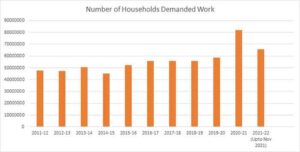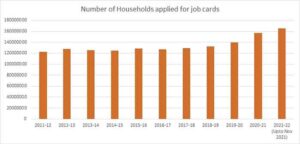The pandemic wreaked havoc on Pappu Singh and Sheela Devi’s family, residents of Nagla Vidhichand village situated on the Agra-Gwalior highway in the southern part of Agra district. While none of their family members fell prey to the Covid-19 infection, their five-year old daughter Sonia did succumb to starvation induced death on August 21, 2020 following the lockdown. They have two other children, Pavan and Pooja. While Pappu Singh is unable to work due to a chronic illness which leaves him mostly bedridden in his small one-room dilapidated house, Sheela Devi is the sole earning member who works as a daily wage labourer on construction sites.
With suspension of all non-essential economic activity after the imposition of lockdown on March 25, 2020 the family was left in the lurch with no ration card. There was no supply of food or ration despite the March 29 order of the Union Ministry of Home Affairs directing states to ensure provision of food for the poor and needy people. The incident brought to national attention the harsh impact of the pandemic response as several news organisations covered it. A ration card was made for Sheela Devi’s family thereafter. They also received a free LPG cylinder under the PM Ujjwala scheme.
Not a lot has changed for the family in more than a year’s time since. Though the ration supply has alleviated their misery a bit, Sheela Devi is still running the household on what little she earns while Pappu Singh continues to be bedridden because of his condition. The family could not afford to get their LPG cylinder refilled since it ran out almost a month after it was first given to them.
Pappu’s nephew Pirghas does freelance work for shoe manufacturers. He stiches shoes at his house out of scraps provided by the local shoe manufacturers. He earns a mere Rs 15 for a pair of shoes. A hard and long day of painstaking work would earn him around Rs 200 at the most. During the lockdown he didn’t get any work. With no ration card or source of livelihood Pirghas had to work as daily wage labourer during the lockdown and could earn only up to Rs 100 per day on the days he could get work.
The Hunger Problem Worsened by the Pandemic
In the 2021 Global Hunger Index India has slipped to 101th position among 116 countries while it ranked 94 out of 107 countries in 2020. Prof Jean Dreze says “The economic crisis due to the pandemic was a massive shock. With many people losing jobs, their conditions changed drastically which also had an impact on their intake and nutrition levels”.
One of the main reasons behind the hunger crisis is the lack of coverage of National Food Security Act. According to the information provided by the UP Food and Civil Supplies Department in a response to the RTI application filed by this author in 2020 18,89,937 ration card applications in UP were pending out of a total of more than 1.86 crore applications by July 2020.
Prof Reetika Khera suggests that social support programmes in the form of subsidised food or employment generation meant to protect people are not casting their net wide (or deep) enough. As she and Anmol Somanchi have pointed out in their analysis of the coverage of PDS published in 2020 the coverage of NFSA is still deficient by at least 100 million people (based on projected population of 2021).
Those without ration cards could not benefit from the government’s allocation of 5kg wheat or rice and 1kg of preferred pulses for free announced under the Pradhan Mantri Garib Kalyan Yojana Package. Khera says “The central government should increase the quota of ration cards for each state taking into account the population increase in the past ten years.” She adds that these cards should be permanent and not just for a few months to be used only during the pandemic.
The increase in demand for work through MGNREG
More than 8 crore rural households demanded work through Mahatma Gandhi National Rural Employment Guarantee Scheme in the year 2020. This was a 39.4% of increase in the total number of households demanding work from 2019 and marked the highest number since 2011. The number of households demanding work has already crossed 6.6 crores by the end of month of October in 2021.

MNREGA public data portal
More than 15 crore households had applied for job cards in 2020 which is higher than in any year of the past decade by almost 2 crores. This figure crossed the mark of 16 crore up to the end of the month of October in 2021 when a majority of states had already exhausted their allotted MGNREG funds. These new applications reveal the continued impact of the economic distress in rural India.

Source: MNREGA public data portal
Khera says, “It is well known that there is a huge demand for work through the MGNREGA even in normal times. There is a lot of pending demand for work because the budget is not adequate”. She adds, “The lack of funds is killing the programme, not allowing it to reach its potential.” She also points to the persistent problem of delay in payments of wages and the hurdles posed by Aadhaar-related errors not only in this scheme but others as well.
Indian disaster management framework and government’s pandemic response
The disaster management framework of India does not appreciate the uniqueness of pandemic as a disaster situation where the pandemic response can itself spell disaster for an indefinite period of time due to suspension of all economic activity.
Dreze says “Whether today it’s covid or tomorrow it is a drought or a flood, any of these crises can push people to the edge.” He points out that though there are some important elements of social security in place such as the pension scheme, food security act or employment guarantee scheme they are only patchy. He adds, “If we consolidate these programmes into some kind of coherent social security system, in a situation of crisis there would be a more effective response than we have seen in the last two years. We need a system that addresses vulnerability during ordinary times which would also help in the times of crisis like this.”
The original article published in Counter Currents can be accessed here.
Centre for Financial Accountability is now on Telegram. Click here to join our Telegram channel and stay tuned to the latest updates and insights on the economy and finance.
